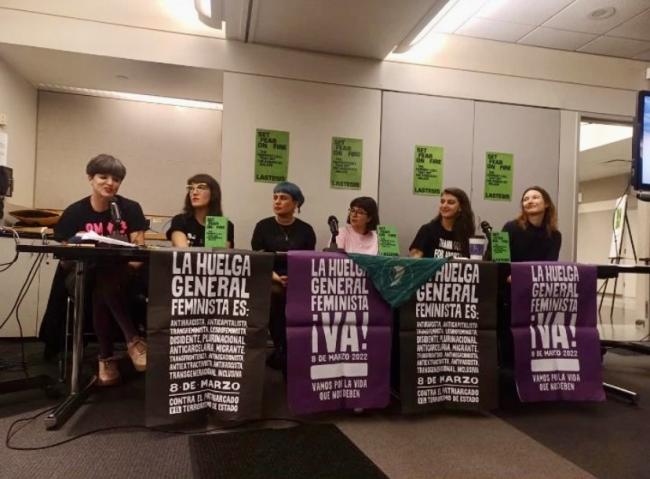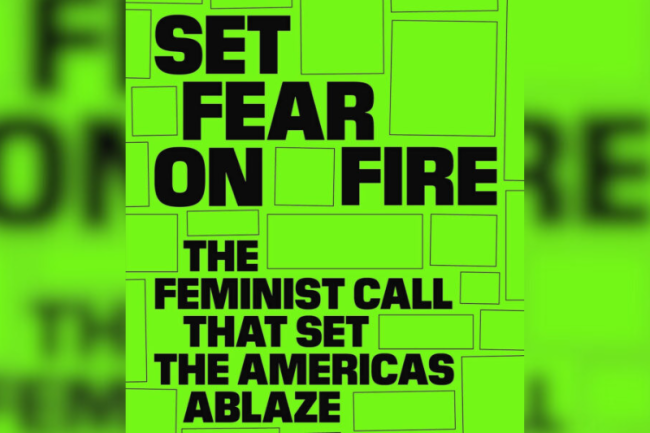
Leer este artículo en español.
During the 2019 uprisings in their native Chile, the interdisciplinary and feminist art collective created and debuted their participatory performance piece “A Rapist in Your Path” to denounce gendered violence and the role of the state in perpetuating it. The performance went viral, becoming a grassroots feminist anthem that was recreated all over South America and around the world.
Even though the original Spanish-language version of LASTESIS’s second book, Set Fear on Fire: The Feminist Call that Set the Americas Ablaze, carries manifesto in its subtitle (a decision made by an editor), it is not a manifesto in the traditional sense—in fact, it is not a manifesto at all. It is not a declarative text that claims to say anything new or to speak for a movement; it doesn’t claim to explain what feminism is. Rather, it is a book of personal, and therefore collective, reflection, driven by the belief that reflection must be accompanied by action, in this case against patriarchy and capitalism. Set Fear on Fire is their unabashed account of rage, femicide, abortion, homophobia, transphobia, of shared denunciations for collective struggle. For LASTESIS, the transformative potential of art and performance is key, and this book illuminates it all.
On the week of March 8, International Working Women’s Day, I joined LASTESIS collective members Daffne Valdés Vargas, Paula Cometa Stange, and Sibila Sotomayor Van Rysseghem for the U.S. launch of their book, with commentary by performance artist and scholar Maria José Contreras and educator and scholar-activist Ángeles Donoso Macaya. In the following text, delivered at the book launch at the CUNY Graduate Center, I describe my experience and reflections on translating the English edition of the book.
On the week of March 8, International Working Women’s Day, the LASTESIS Collective joined Chilean performance artist-scholar Maria José Contreras, Chilean educator and scholar-activist Ángeles Donoso Macaya, and translator Camila Valle for the U.S. launch of the English-language translation of their book Set Fear on Fire: The Feminist Call that Set the Americas Ablaze.
During the 2019 uprisings in their native Chile, the interdisciplinary and feminist art collective created and debuted their participatory performance piece “A Rapist in Your Path” to denounce gendered violence and the role of the state in perpetuating it. The performance went viral, becoming a grassroots feminist anthem that was recreated all over South America and around the world. Set Fear on Fire is their unabashed account of rage, femicide, abortion, homophobia, art, and collective struggle.
In the following text, delivered at the book launch in March, Valle describes her experience translating the book.
As an introduction, I would like to offer a few brief starting points on how I have been thinking about this magnificent work by LASTESIS, Set Fear on Fire, from the perspective of my translation work. Translating the book from Spanish to English has been an important way of thinking not only about this work but also, more broadly, about feminism in general.
I consider the publication of the English-language translation of this book to be an event, largely because texts on feminist theory that spread from South to North, rather than the other way around, remain the exception. The English-speaking left suffers from a great crisis of translation—a crisis with significant political ramifications and implications that have to do not only with the hierarchy and international division of labor but also with a colonial, imperialist, extractivist arrogance, which seeks to capture as much value as possible from our territories but always leaving aside the value of our ideas and our resistance. The developmentalist paradigm extends to the production of knowledge. This paradigm that says that the South needs to catch up to the United States and Europe also impacts how knowledge that comes from our countries is valued.
If we think about the texts that we consider to be feminist classics in Latin America, the texts of thinkers that are widely read in our places of origin, we realize that almost none of them are translated into and published in English. There is really very little that is available in English and that is considered a theoretical reference point in this country. In this sense, this translation is a step forward. Translation as a process is a way of understanding the ideas, the theory, the activists of the South as equals and of identifying the debt we owe to them. We have the right to self-produce and theorize about our own lives, experiences, and struggles, and that what is read and studied in the North about the South comes directly from us. This conversation that we are having now, this event, is another example of the power of listening, and of how what we live comes and goes, migrates, with us.
I also think that the act of translation is a fundamental part of the work of LASTESIS and of feminist movements in general. That is, politics is translation work, and if it is not, it is because there is something that’s not working. Feminism is always transforming one thing into another, embodying different methods of legibility and intelligibility. LASTESIS shows us that feminism is not anti-intellectual, but rather redefines what this means: theory is a song, language is our bodies, oppression is a creative montage, to use Silvia Rivera Cusicanqui’s phrase. All of this is translation.
The fact that LASTESIS performance’s “A Rapist in Your Path” has been reproduced in so many parts of the world, in different continents, is a great example of this. Each recreation was made in its own context, with its own denunciations, but nevertheless these locally adapted reproductions announce, account for, and knot together the continuities of the violence of capitalism, patriarchy, racism, imperialism, of all the systems that oppress us and also of resistance across time and space—and this is the work of feminism.
Here I want to bring as examples two terms that caught my attention in my translation process and that I had to think about not only linguistically but also as issues of communicating a political sensibility, a way of doing and relating to politics and theory.

The first is the verb violentar, which does not exist in English. A fuller translation of the word would be to subject someone or something to violence, or to exercise violence against someone or something, but there is not a single word that encompasses the act of violentar as we understand it in Spanish. So, when I had to translate this word, many times, instead of writing to subject to violence, I had to specify the type of violence I was referring to—to assault, to beat, to rape, to persecute—more than anything as a matter of concision and cadence. But I think that the fact that there is a verb in Spanish that can contain all types of violence also reflects the strength of Latin American feminisms in putting forward a much broader understanding of violence, one that can encompass economic, racial, gender, colonial violence all at the same time, that does not separate the different types of violence, does not isolate them. It theorizes violence in a systemic way that neither demobilizes nor victimizes, but rather inspires and activates.
The other term that struck me during my translation process that I want to highlight is subjetividades—subjectivities—a word that appears many times over in the text. Here in the United States, it seems to me that the issue of political subjectivity as a feminist concern or a concern of the left is hardly worked on. Within the most popular of feminisms, capitalism as a process of subjectivization is not seriously spoken of. There is a lot of talk of the different ways in which the forces of society intersect to oppress us in particular ways, but not as much about how we become who we are beyond a condition of oppression or exploitation, not as much about our conditions of struggle. I believe that this attention to subjectivities or to subjectivization is part of a metaphorical strategy of Latin American feminism that says that capitalism and the various forms it takes imply an intervention in the subjectivity of each one of us, and therefore that this must also be a task and an intervention of feminisms.
The times I have read theory in Spanish and I am amazed at how beautiful it is, how beautiful the language used to describe difficult concepts, and when I read theory in English, I find that it lacks that creativity, that imagination—not always, but often. I think this is a key point and one of very significant political lucidity.
Current feminist movements have theoretical desires; they are highly involved in generating materials and narrative tools, in making an archive of the present, in nurturing the different types of links that we can have with others and among ourselves. Within this, an art collective like LASTESIS is a very clear link. We deserve beauty, the poetic, and not only do we deserve it, but it also forms a political terrain, as the book makes clear. To quote Audre Lorde: “This is poetry as illumination, for it is through poetry that we give name to those ideas which are, until the poem, nameless and formless—about to be birthed, but already felt.”
This book for me is all of this. And being able to share it and weave South-North dialogues is not just a matter of solidarity with another place and with what happens in another place, but rather it is a way of thinking, from here, about how to understand things, how to tie struggles together and condense meanings. I feel very grateful to have been part of this project, to direct it in a certain way, to LASTESIS for all their work, and to feminism.
Camila Valle is an activist, researcher, writer, and translator who works as an abortion educator and abortion acompañante or doula. She is the translator of Set Fear on Fire: The Feminist Call That Set the Americas Ablaze by LASTESIS (Verso Books).

